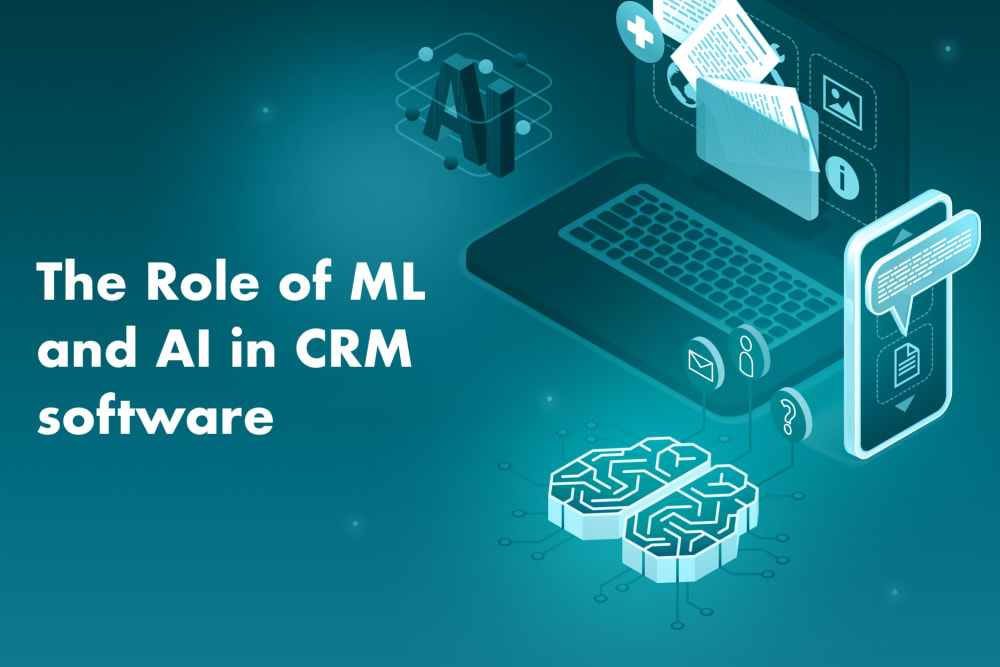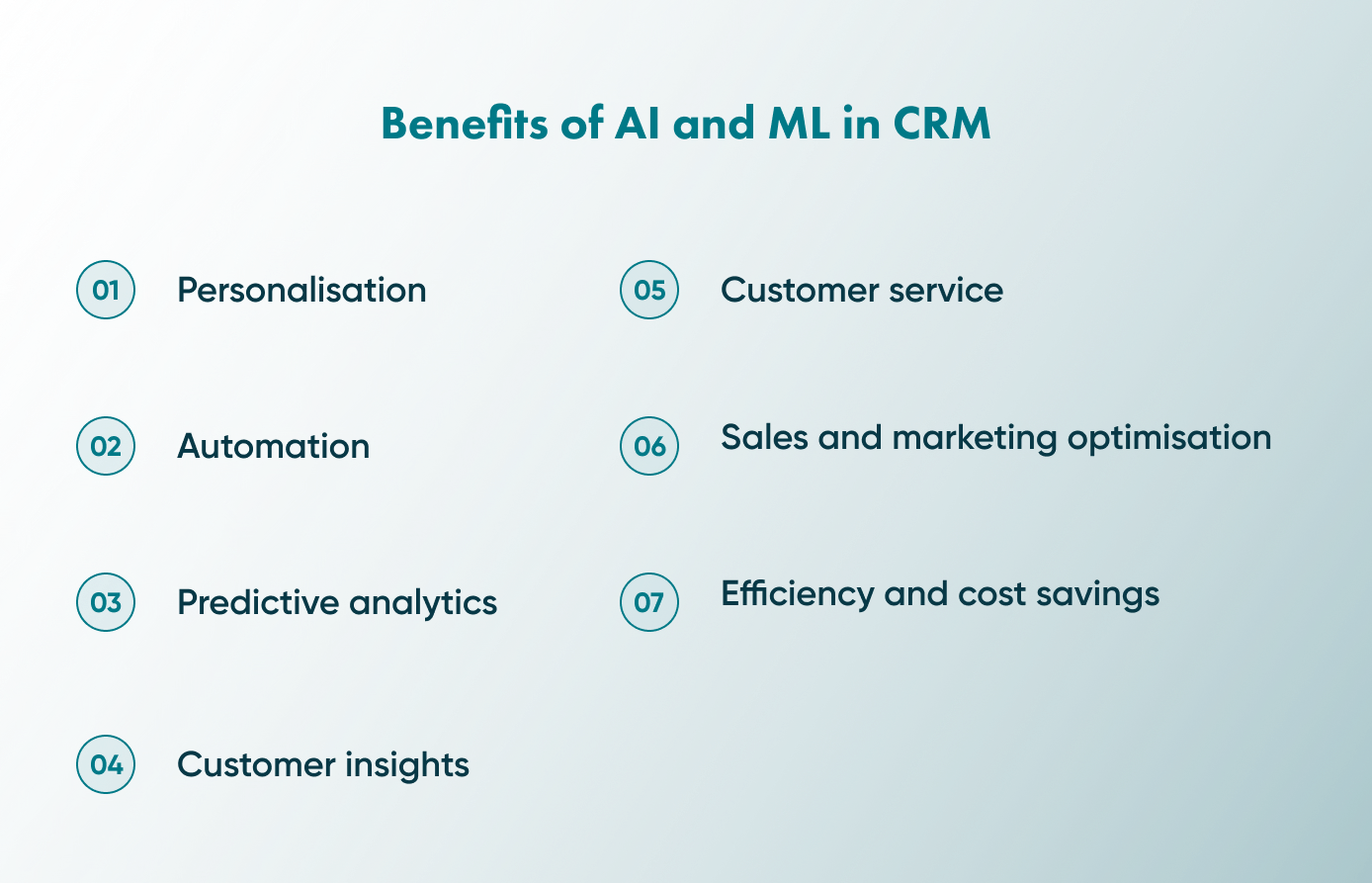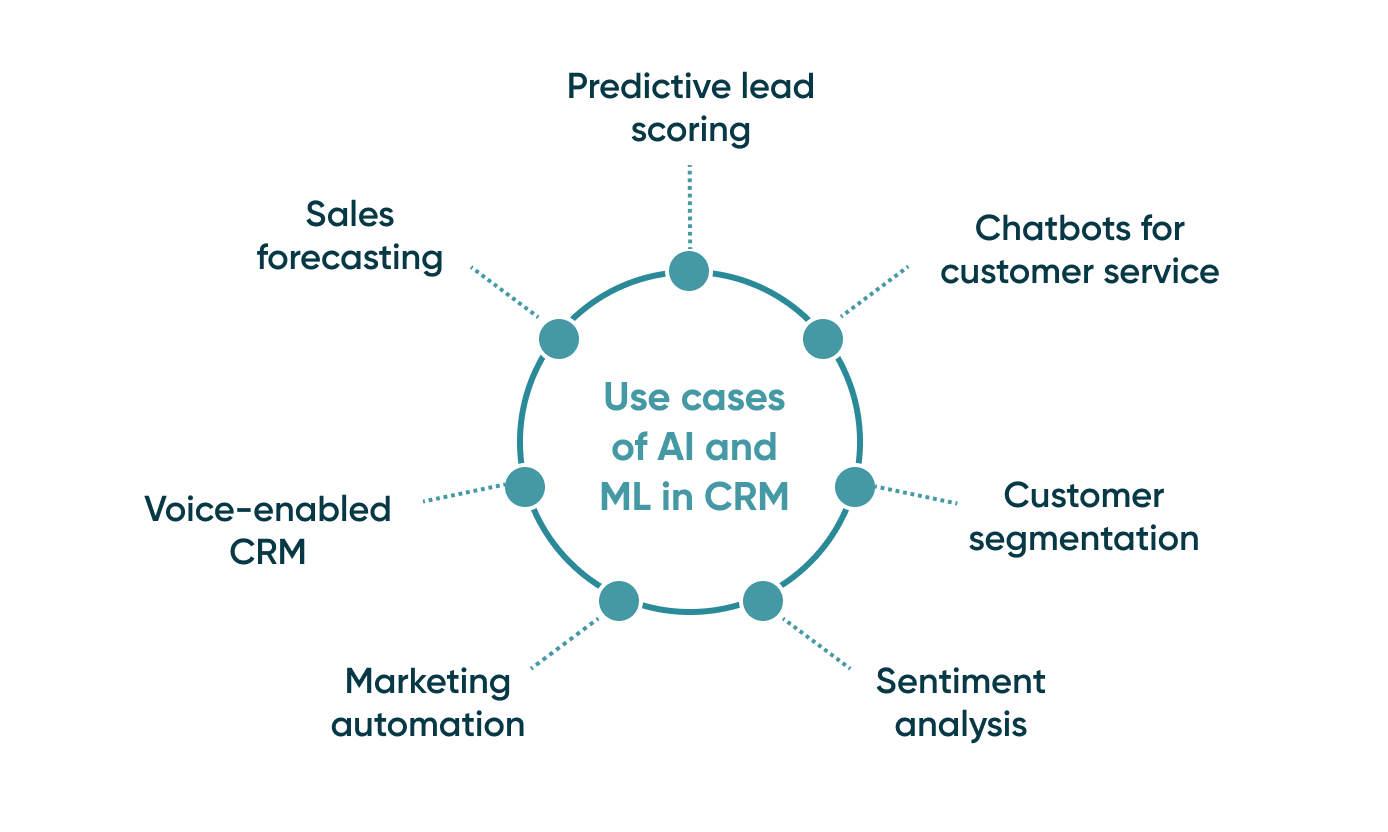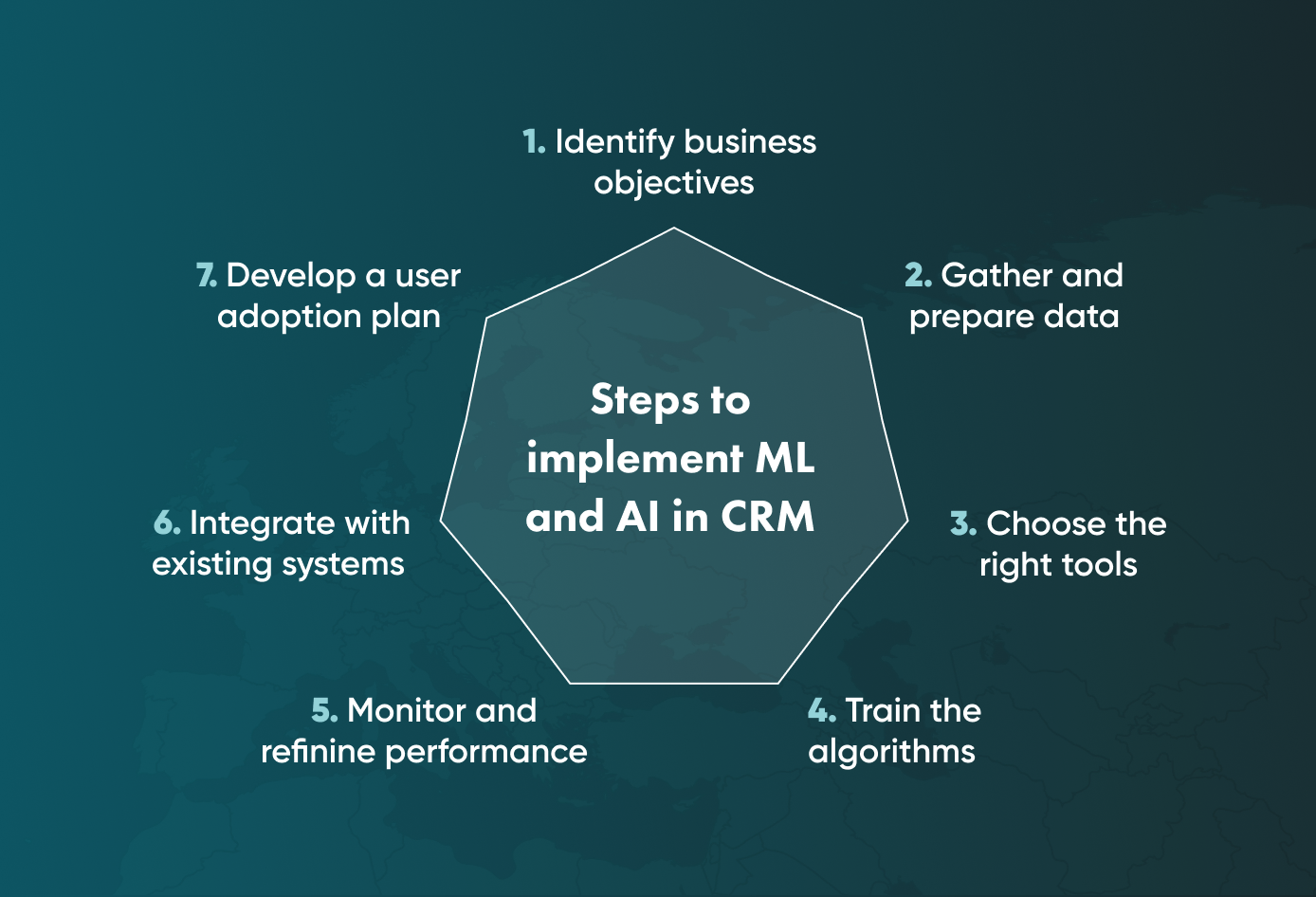The Role of Machine Learning and Artificial Intelligence in CRM Software


Customer relationship management (CRM) software needs no introduction. We know that it helps businesses manage customer interactions and improve customer relationships. It typically includes features such as customer data management, sales and marketing automation, and customer service tools.
CRM software has become increasingly important in modern business as companies seek to improve their customer experience and gain a competitive advantage.
Machine learning and AI have transformed CRM software development by enabling businesses to gain deeper insights into their customers, automate routine tasks, and provide more personalised experiences.
For example, machine learning algorithms can analyse customer data to identify patterns and predict customer behaviour, while AI-powered chatbots can provide customer service support around the clock.
This article will cover the role of machine learning and AI in CRM software development, including how these technologies can enhance the features and functionality of CRM software.
We’ll also cover the challenges of implementing machine learning (ML) and AI in CRM, steps for integration, and recommendations for businesses looking to implement these technologies in their CRM software development.

Primary advantages of AI and ML in CRM
As usual, we cannot ignore the advantages of ML and AI for CRM systems. Let’s dive deeper into these benefits.
Personalisation
ML and AI can analyse customer data to provide highly personalised experiences. It can help businesses tailor their marketing and sales strategies to each customer, improving engagement and driving conversions.
For example, ML and AI can analyse a customer's purchase history, browsing behaviour, and preferences to recommend personalised content and promotions.
Automation
ML and AI can automate tasks such as data entry, lead scoring, and social media management. As a result, it frees up employees to focus on more complex tasks, improving efficiency and reducing errors.
For example, ML and AI can automatically assign leads to sales representatives based on factors such as lead source, industry, and behaviour. In CRM, machine learning can take the automation process to the next level.
Predictive analytics
ML and AI can analyse customer data to identify patterns and predict customer behaviour. It enables businesses to make data-driven decisions and take proactive steps to retain customers. For example, ML and AI can predict customer churn, allowing companies to take steps to retain customers before they leave.
Customer insights
ML and AI can give businesses more profound insights into customers' needs and preferences. It can inform product development, marketing strategies, and customer service initiatives. For example, ML and AI can analyse customer feedback to identify common themes and pain points.
Customer service
AI-powered chatbots can provide customer service support around the clock, improving the customer experience and reducing employee workload. Chatbots can respond instantly to common customer inquiries and escalate complex issues to human representatives.
Sales and marketing optimisation
ML and AI can optimise sales and marketing strategies by identifying high-potential leads, recommending personalised content, and predicting customer churn.
For instance, ML and AI can analyse customer data to identify leads with a high likelihood of conversion and provide sales representatives with relevant information to close deals. When using a CRM, artificial intelligence can significantly improve your workflow in this situation.
Efficiency and cost savings
By automating routine tasks, businesses can save time and reduce costs. In addition, it can free up resources to invest in other business areas, such as product development or customer service initiatives. ML and AI can also help businesses to identify areas where processes can be streamlined or optimised, leading to further cost savings and efficiency gains.

Top applications of ML and AI in CRM systems
Along with the benefits mentioned above, you also should understand how ML and AI can be applied in your CRM systems. Here’s some practical examples:
Predictive lead scoring
Predictive lead scoring is a machine learning technique used in CRM software to predict the likelihood of a lead becoming a customer.
This involves analysing historical data about leads and customers, such as their demographics, behaviour patterns, and interactions with the business, to identify common characteristics and behaviours associated with conversion.
The predictive lead scoring model assigns a score to each lead based on their likelihood of becoming customers. The score is calculated using historical and real-time data, such as the lead's current behaviour and engagement with the business.
Predictive lead scoring is an effective way to optimise lead management and increase conversion rates. It is a powerful tool for companies looking to improve their sales and marketing processes.
ML and AI can analyse customer data to predict which leads will most likely convert. This enables sales teams to prioritise leads with the highest potential and focus on closing deals.
Chatbots for customer service
Chatbots are computer programs that use AI and natural language processing (NLP) to simulate human-like conversations with users.
In recent years, chatbots have become increasingly popular in customer service as they can provide immediate and personalised assistance to customers without requiring human intervention.
Chatbots can be programmed to handle routine customer queries, such as providing information about products or services, checking the status of orders, and providing essential troubleshooting advice.
Also, they can provide round-the-clock support to customers, allowing businesses to provide better customer service and improve customer satisfaction. Chatbots improve the customer experience and reduce the workload on customer service teams.
For more valuable information on this topic, we recommend you also read our article about the future of chatbots for marketing.
Customer segmentation
This is the process of dividing a customer base into smaller groups of customers with similar characteristics, needs, or behaviours.
By grouping customers based on shared characteristics, businesses can tailor their marketing efforts to each group, providing more targeted and relevant messages and offers.
Segmentation can be done manually using data analysis tools or with the help of machine learning algorithms.
ML algorithms can analyse large amounts of data to identify patterns and relationships that humans may be unable to detect.
As a result, AI and CRM combination can result in more accurate and effective segmentation, leading to better marketing outcomes and increased revenue.
Sentiment analysis
This use takes advantage once again of NLP techniques to identify and extract subjective information from text data, such as social media posts, reviews, and customer feedback.
Sentiment analysis determines whether a text expresses a positive, negative, or neutral sentiment towards a particular topic or product.
Moreover, sentiment analysis can monitor online conversations about a brand or product, allowing businesses to identify and respond to customer complaints or negative reviews in real-time.
Also, it can track and manage a business's online reputation by monitoring online reviews and social media conversations.
Marketing automation
This is the use of technology to automate repetitive marketing tasks, such as email marketing, social media posting, lead generation, and customer segmentation.
Marketing automation aims to streamline marketing processes and improve the efficiency and effectiveness of marketing campaigns. CRM with AI enables marketing automation and makes it more accessible.
Marketing automation can create and send personalised emails to customers based on their behaviour and interests.
It can also capture leads and track their behaviour, allowing businesses to identify and nurture the most promising leads with targeted marketing campaigns.
Marketing automation platforms often include analytics and reporting tools, allowing businesses to track the performance of their marketing campaigns and make data-driven decisions.
Feel free to read our article about top marketing automation trends.
Voice-enabled CRM
Voice-enabled CRM enables users to interact with a CRM system using natural language voice commands.
With voice-enabled CRM, users can use their voice to perform various tasks, such as entering and updating customer information, creating new tasks and appointments, and retrieving sales and marketing data.
It allows users to enter and update customer information without typing on a keyboard or mobile device. It can save time and increase productivity, especially for salespeople on the go.
Voice-enabled CRMs can provide personalised customer interactions, such as sending targeted offers and promotions to customers based on their previous interactions with a business. Using AI, CRM systems can utilise voice recognition algorithms to the fullest.
Sales forecasting
AI-based CRM can predict future sales performance based on historical sales data, market trends, and other relevant factors. Sales forecasting helps businesses to plan their sales and marketing strategies, allocate resources, and make informed business decisions.
ML and AI can analyse historical sales data, market trends, and other relevant factors to identify patterns and trends that can be used to predict future sales performance.
Keep your competitors from getting ahead of you - explore the benefits of AI and machine learning for your CRM today. Contact Go Wombat to learn more.

AI-powered CRM: What essentials do you need for an AI-enabled system?
It is not possible to simply add AI agents to your CRM and expect great results. Data must be strong, comprehensive, well-structured, and consistent for AI in CRM to bring real value. Here is a brief checklist to determine if your customer relationship management system is prepared for AI assistant insertion.
1. Data Quality
Good data quality implies that historical data and customer records are accurate and up to date. AI will be misled by duplicates, missing information, or even contradictory information. However, you can still allow AI CRM tools to help by employing automated data entry to minimise the errors of manual data input and keep your sales records impeccable.
2. Data Volume
AI-powered tools are unable to function without a reference history. So, think of sales leads, purchases, routine customer inquiries, emails, support tickets, sales operations, customer communication - the more data you have, the better it will be. In order to get real insights to make data-driven decisions and boost productivity, your AI CRM should be filled with quality data.
3. Data Diversity
Just don't focus on the sales processes only. Track the customer behaviour, purchase history, demographics, and customer service interactions along with sales. This will help AI systems to see more angles of a situation and thus better be able to spot sales trends and make predictions.
4. Data Consistency
It is very important to maintain the same data structures throughout all your data sets. Also, the data elements like dates, names, and IDs should be consistent. With this clear data, AI integrations will be more focused and less error-prone.
5. Integrations & APIs
In addition to CRM solutions eliminating all the pain points of your business, it has to play well with other tools like ERP, marketing platforms, analytics, and data warehouses. The more interconnected your CRM, the more effective your AI sales assistant will be.
6. Real-Time Data
In case your sales CRM is capable of updating data in real-time, your AI will be able to provide solutions at once by forecasting customer behaviour - whether it be closing a deal, analysing historical data, customer segmentation, assisting with a support ticket, or even predicting customer churn before it happens. AI CRM automation speeds up processes, thus your team will be able to stay ahead of the game.
7. Data Security
Good data security can be achieved by implementing strong permissions, encrypting data, and being GDPR compliant. When AI tools are being trained, it is of utmost importance that data security is guaranteed.
8. Clear Labels & Event Tracking
Be sure that significant events such as "demo booked" or "purchase made" are always tagged. In case AI CRM software is provided with clearer signals, it will learn quickly and perform more efficiently.
Implementing this sales process checklist into your work will make your CRM prepared for more dependable and flexible AI-driven automation.

7 steps to implement ML and AI in CRM
Implementing artificial intelligence and machine learning in CRM requires careful planning and execution to ensure success. So we provide a list of the main steps for you to consider.
1. Identify business objectives
Before implementing AI and ML in CRM, businesses must identify their goals and the specific problems they are trying to solve. This will help define the project's scope and identify the required data.
Using AI, CRM software should be able to perform tasks that are valuable to your aims. The benefits to integrating AI must be clear.
2. Gather and prepare data
AI and ML require large amounts of data to operate effectively. Therefore, businesses must gather and organise their data to ensure it is accurate, complete, and relevant.
This may involve cleaning, organising, and integrating data from multiple sources.
3. Choose the right tools
Many AI and ML tools are available for CRMs, and businesses need to choose the right ones for their needs.
Thus you will need to evaluate different tools based on their capabilities, ease of use, and cost. However, it is better to entrust this task to qualified professionals like Go Wombat — we will choose the proper tech stack for you.
4. Train the algorithms
AI and ML algorithms need to be trained on data to learn patterns and make predictions.
So, when Go Wombat’s specialists create an AI-powered CRM, they will start by selecting a sample of data and using it to train the algorithms before testing them on new data.
5. Monitoring and refining
AI and ML models are not perfect. Businesses need to monitor their performance and refine them over time. This may involve tweaking the algorithms, adding new data, or adjusting the model parameters.
6. Integrate with existing systems
Before integrating AI and machine learning technologies, you need to assess your existing CRM system and identify areas that can be improved.
This way, you will better understand what kind of AI and ML applications will be most beneficial for your business.
7. Develop a user adoption plan
To ensure success, businesses need to develop a user adoption plan to encourage the adoption of the new AI and ML tools by employees. The rollout of such a plan may involve training, communication, and incentives to promote adoption.
Challenges of implementing ML and AI for CRM
Although the benefits of implementing machine learning and artificial intelligence in CRM software development are significant, there are also several challenges that businesses may face.
Data quality
The success of ML and AI in CRM depends on the quality and quantity of data available. Companies need to ensure that their data is accurate, complete, and up to date in order to achieve the best results.
Poor data quality can result in inaccurate predictions and flawed insights.
Integration with legacy systems
Many businesses still use legacy systems incompatible with modern ML and AI technologies. Integrating these systems can be challenging and time-consuming, requiring significant resources.
Security and privacy concerns
ML and AI require access to sensitive customer data, which can raise security and privacy concerns.
Businesses need to implement robust security measures to protect this data from unauthorised access and ensure compliance with data protection regulations.
Remember that when you incorporate artificial intelligence, the CRM system must be adequately secured.
Talent and skills gap
Implementing ML and AI in CRM requires specialised skills and expertise, which can be hard to find. Businesses may need to train or hire additional staff to support these initiatives.
Cost
Implementing ML and AI in CRM can be expensive, requiring significant hardware, software, and personnel investment. Smaller businesses may struggle to afford these costs and must prioritise which initiatives to pursue.
Ethical considerations
AI and ML raise ethical questions about using customer data and the potential for bias in decision-making. Businesses must consider these issues carefully and ensure their initiatives are transparent and honest.
What Is Next to AI-Powered CRM Trends (2026–2030)
CRM equipped with AI agents is undergoing rapid changes. Within a few years, one can expect a great change in the direction of personal, predictive, and automated customer interactions and experiences. If you wish to be a step ahead, these are the possibilities to look forward to.
1. Hyper-Personalisation
Hypothetically, AI will be able to generate offers, messages, and customer experiences unique to every client at any given time. Behaviour understanding, intent recognition, and even emotionality detection as sentiment analysis will be the features of AI. Besides, a generative AI tool will be instrumental in refining marketing and serving customers at all stages.
2. Emotion & Sentiment AI
In the future, AI will probe the emotion, urgency, and sentiment of communication via email, calls, and chats. Integrating AI will thus allow customer support to respond with empathy while handling simple questions to keep customers satisfied.
3. Autonomous CRM Workflows
AI will be able to perform CRM functions such as task assignment, follow-up mail sending, record updating, and personalise marketing campaigns or trigger their initiation without any human intervention. Your sales and marketing teams will then have more time to focus on other important matters.
4. AI Sales and Support Assistants
The main functions of conversational agents will be to handle complicated questions, draft proposals, summarise meetings, and assist customers in decision-making. AI-driven lead scoring, deal management, and pipeline progression are among the tasks that they will perform while supporting smart CRM professionals and sales leaders at the same time.
5. Predictive Customer Health
AI will keep monitoring the factors that can lead to customer churn, upselling, and customer lifetime value. With the help of better forecasting and analytics, you will have the deepest understanding of your customers' needs, and you will be the first one to know the business actions that need to follow.
6. Voice-First CRM Interfaces
The use of voice-enabled CRM systems will facilitate sales teams in updating records, getting insights, and managing tasks while they are not at their desk. The leading CRM platforms and sales software are moving in this direction by integrating these features.
7. Data Cleanliness Automation
By AI, duplicate records will be automatically identified, formatting issues will be corrected, missing information will be enriched, and CRM hygiene will be maintained with a minimum of human intervention. Well-maintained CRM data, including purchase history, will empower organisations to become data-driven and get deeper insights.
8. Privacy-First AI Models
Federated learning and secure data processing methods will enable companies to use AI advantages while observing user privacy and regulatory constraints. This will be in line with customer expectations, customer retention, customer lifecycle, customer journey mapping, and will contribute to improving customer relationship management.
In the future, marketing campaigns will be more focused due to AI CRM platforms that will allow businesses to personalise marketing campaigns, automate routine tasks, increase productivity, and provide sales forecasts and actionable insights. AI-powered CRM tools will be the source of power for organisations to implement the future of AI CRM by automating processes, optimising engagement and sales performance, and driving strategic growth.

Why cooperate with Go Wombat?
Businesses may need the assistance of a reliable software development company like us to integrate AI into their CRM system for several reasons, and here they are:
Technical expertise
Integrating AI into a CRM system requires highly technical knowledge of AI and CRM system development. Go Wombat has a team of experienced developers with expertise in both areas, ensuring the integration is done correctly.
Customisation
Every business has unique needs and requirements regarding its CRM system. Our software development company can help customise the AI integration to meet the business's specific needs, ensuring it delivers maximum value.
Integration with existing systems
Go Wombat’s developers can ensure that the integration is seamless and does not disrupt existing operations.
Testing and validation
AI integration must be thoroughly tested and validated to ensure it works correctly and delivers the intended results.
A software development company like us can perform rigorous testing and validation to provide reliable and practical integration.
Ongoing support
AI integration is not a one-time project but rather an ongoing process. A dedicated software development company can provide continuing support and maintenance to ensure the AI integration functions optimally over time.
Conclusion
Integrating AI and machine learning technologies in CRM software development changes how businesses approach customer relationship management.
By leveraging the power of these technologies, companies can gain valuable insights into customer behaviour, streamline their processes, and improve overall efficiency and accuracy.
From predictive lead scoring to voice-enabled CRM, many AI and machine learning applications in CRM software development can help businesses improve customer engagement and drive growth.
However, implementing these technologies can be complex and challenging, requiring specialised knowledge and expertise.
That’s where Go Wombat comes into play. Our company is ready to help you with AI integration and CRM software development and ensure everything functions properly. A skilled development team will do what you need, considering all your technical requirements and expectations.
So take the first step towards a more innovative and efficient CRM. Contact us today to schedule a consultation!
Unlock Success with Premium Software Development
Contact us


FAQs
What are the benefits of AI in CRM?
The main benefits of AI in CRM include personalisation, automation, predictive analytics, customer insights, customer service, sales and marketing optimisation, and efficiency and cost savings.
How can artificial intelligence improve customer experience?
First of all, AI algorithms can analyse customer data, such as browsing history and purchase behaviour, to create personalised recommendations and offers.
Also, AI-powered chatbots and virtual assistants can immediately assist customers, answering common questions and resolving issues more quickly and efficiently than traditional support methods.
In addition, AI-driven sentiment analysis can analyse customer feedback from social media, surveys, and other channels to identify common themes and sentiments.
What role does machine learning play in CRM?
Machine learning plays a critical role in CRM by enabling businesses to leverage data to gain insights into customer preferences and needs.
For example, ML algorithms can analyse historical customer data to identify patterns and predict which leads will most likely convert into paying customers. In addition, machine learning technology helps develop voice-enabled CRM systems that allow customers to interact with businesses through voice commands.
Besides that, ML can automate marketing campaigns and personalise messaging based on customer behaviour and preferences.
How can we help you ?



